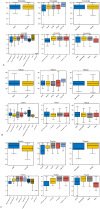Knowledge, attitudes, and practices among oncologists regarding the implementation of DRGs payment system: a cross-sectional study in Beijing
- PMID: 39764195
- PMCID: PMC11700967
- DOI: 10.3389/fpubh.2024.1453962
Knowledge, attitudes, and practices among oncologists regarding the implementation of DRGs payment system: a cross-sectional study in Beijing
Abstract
Background: The KAP survey evaluates health-related knowledge, attitudes, and practices through a structured questionnaire. By collecting qualitative and quantitative data, it measures the current situation, tests hypotheses, and provides insights for enhancing health behaviors and education. In 2019, the National Health Security Administration (NHSA) initiated DRG payment reforms. This study aims to improve the quality of health insurance and policy implementation by assessing physicians' knowledge, attitudes, and practices regarding the DRG system.
Method: This study was a cross-sectional study designed with a questionnaire through simple random sampling method, and respondents were the doctors in the clinical departments of the sampled hospitals. The questionnaire included basic information, knowledge about DRGs, attitude toward DRGs and practice of implementation. Data were analyzed using descriptive statistical analysis, correlation, path analysis and generalized linear model.
Result: A total of 210 questionnaires were included. The majority of respondents aware that their healthcare organizations had already begun to implement the policy. With a mean score of 7.67 for knowledge, respondents basically had a good level of knowledge of DRGs. The mean attitude score of the respondents was 30.20, which was lower than the "positive attitude" criterion, and their main concerns were about matters other than treatment. Knowledge scores were significantly correlated with attitude scores (P < 0.001), whereas attitude scores were not associated with practice scores. Path analysis and generalized linear modeling indicate that knowledge effectively influences attitudes, whereas attitudes do not have an apparent impact on practice.
Conclusion: Oncologists' understanding of DRGs needs to be improved, and their knowledge and attitudes have not yet translated into demonstrable positive practice behaviors. This gap underscores the need for knowledge training and effective incentives.
Keywords: DRGs; Diagnosis Related Groups; KAP survey; attitude and practice; knowledge; validity.
Copyright © 2024 Xu, Zhang and Yin.
Conflict of interest statement
The authors declare that the research was conducted in the absence of any commercial or financial relationships that could be construed as a potential conflict of interest.
Figures



Similar articles
-
Valuation of knowledge, attitude, practices of tuberculosis among the health care workers from Islamabad Pakistan.Acta Trop. 2024 Sep;257:107317. doi: 10.1016/j.actatropica.2024.107317. Epub 2024 Jul 7. Acta Trop. 2024. PMID: 38981566
-
Occupational Category and Professional Title Influencing the Knowledge, Attitudes and Practice (KAP) of Quality Training: A Cross-Sectional Survey From a Tertiary General Hospital.Inquiry. 2024 Jan-Dec;61:469580241249425. doi: 10.1177/00469580241249425. Inquiry. 2024. PMID: 38727154 Free PMC article.
-
Bridging the knowledge-practice gap: A cross-sectional survey assessing physician knowledge, attitude and practice toward complementary and alternative medicine.PLoS One. 2025 May 14;20(5):e0322613. doi: 10.1371/journal.pone.0322613. eCollection 2025. PLoS One. 2025. PMID: 40367283 Free PMC article.
-
Knowledge, Attitudes, and Practices in the Orthopaedic Care of Sexual and Gender Minority Youth: A Survey of Two Pediatric Academic Hospitals.Clin Orthop Relat Res. 2022 Jul 1;480(7):1313-1328. doi: 10.1097/CORR.0000000000002143. Epub 2022 Feb 15. Clin Orthop Relat Res. 2022. PMID: 35167510 Free PMC article.
-
[Psychometric characteristics of questionnaires designed to assess the knowledge, perceptions and practices of health care professionals with regards to alcoholic patients].Encephale. 2004 Sep-Oct;30(5):437-46. doi: 10.1016/s0013-7006(04)95458-9. Encephale. 2004. PMID: 15627048 Review. French.
References
-
- Jacobsen KH. Introduction to Health Research Methods. Burlington, MA: Jones and Bartlett Publishers; (2016).
-
- Perez L, Tran K, Alvarenga-Bezerra V, Chadha D, Dotson L, Assir F, et al. . Cervical cancer-related knowledge, attitudes, practices and self-screening acceptance among patients, employees, and social media followers of Major Brazilian Hospital. Cancer Control. (2022) 29:10732748221135441. 10.1177/10732748221135441 - DOI - PMC - PubMed
MeSH terms
LinkOut - more resources
Full Text Sources
Miscellaneous

